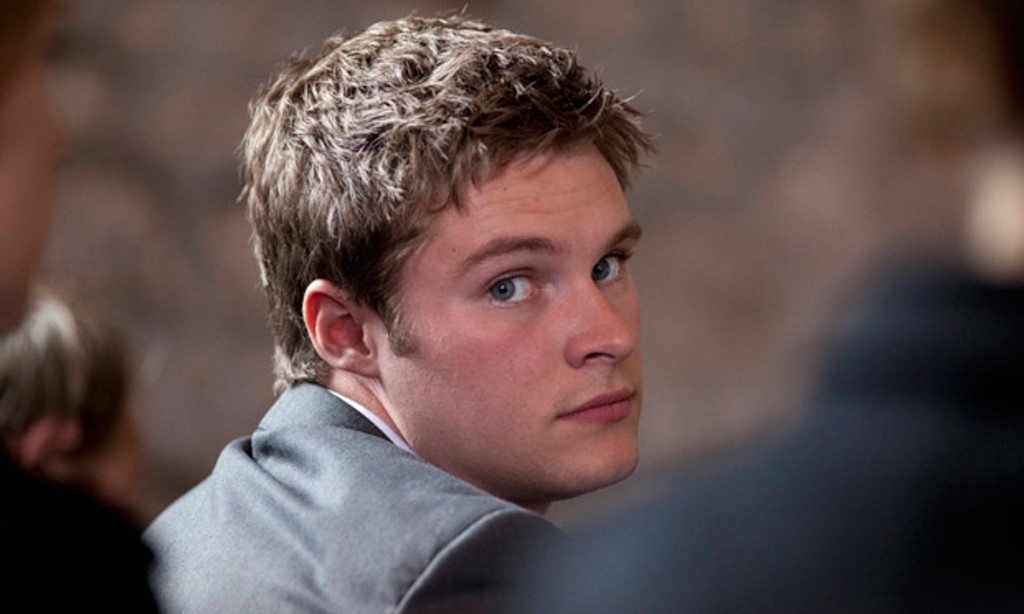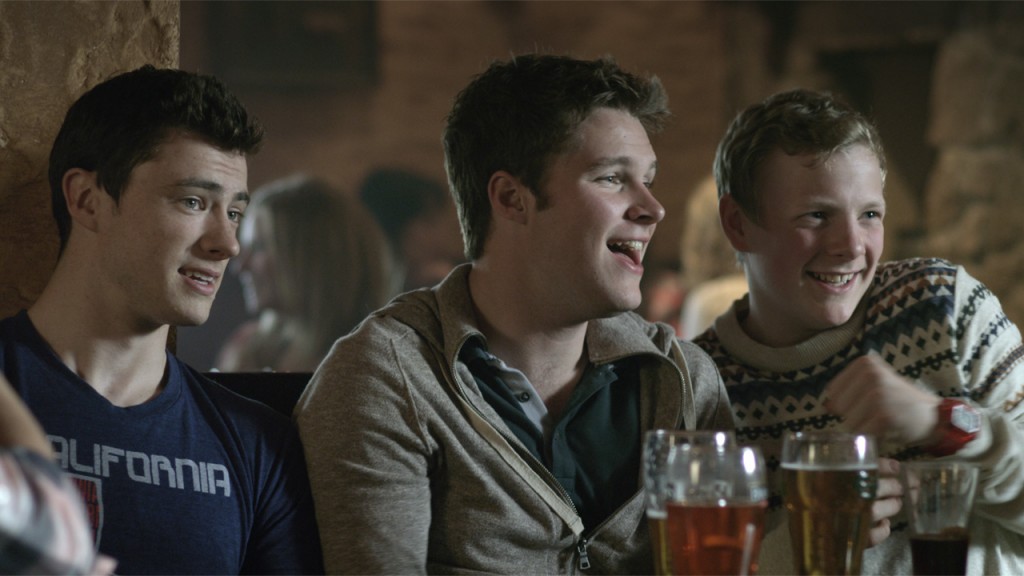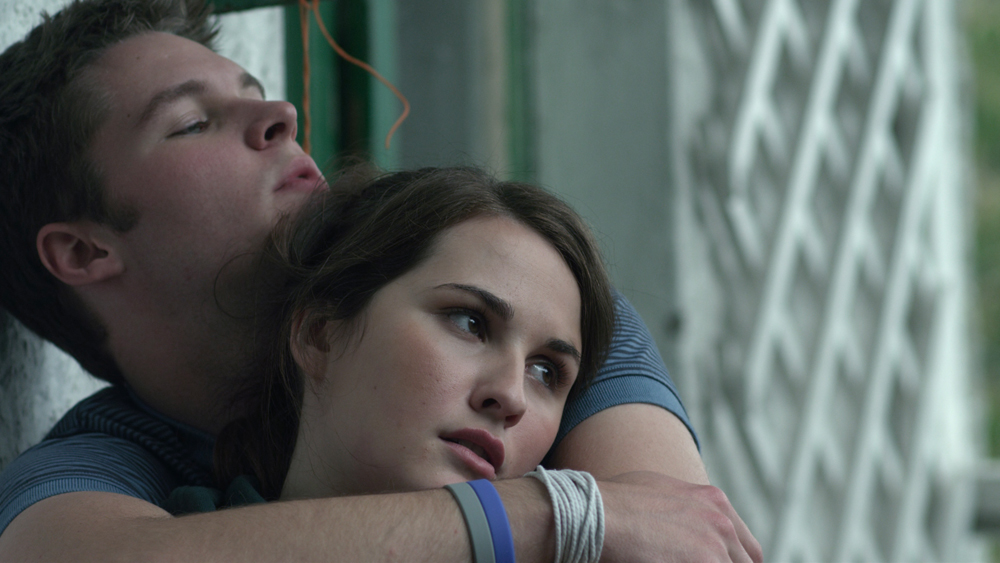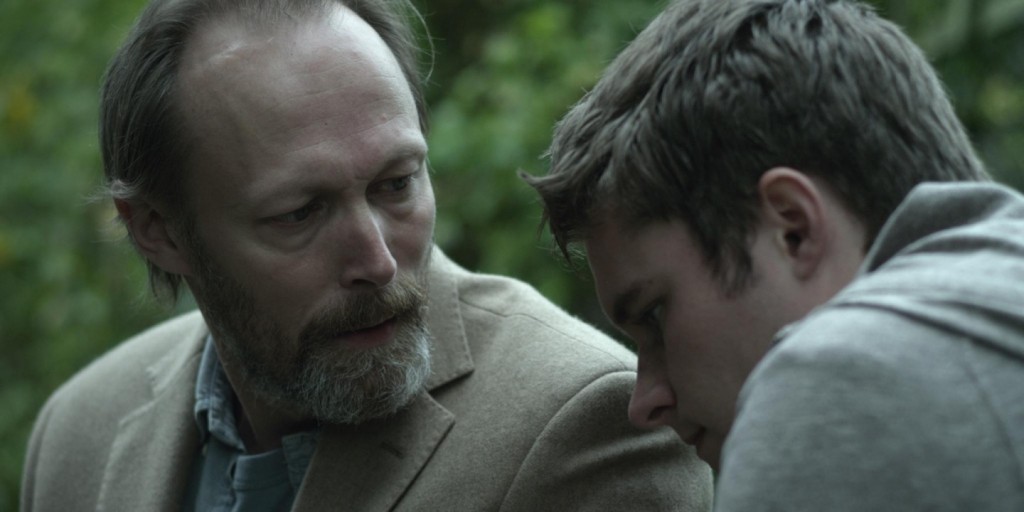This article was first published as a Film and Bible Blog article in Culturewatch. © Tony Watkins, 2012.
For discussion material on this film, see my Damaris Film Blog discussion guide and additional questions for reflection in my Film and Bible Blog article.

Warning: This article contains plot spoilers.
Richard Karlsen (Jack Reynor) has just finished school, having grown up in a prosperous area of South Dublin. The last summer holiday before university stretches ahead of Richard and his friends. Athletic, good-looking and confident, Richard is the undoubted leader of the group of teenagers. He has everything going for him, and a world of opportunity ahead. He has big ambitions to play professional rugby while studying full-time.
Richard and a group of friends, and their friends, head off to the Co. Wicklow coast for a beach party. Some stay with Richard in his parents’ beach house, while others camp nearby. Richard meets Lara (Róisín Murphy), the girlfriend of his friend Conor (Sam Keeley). There is an immediate connection between them, and a short while later, after they meet again at Conor’s 18th birthday party, they begin a relationship. It starts well, but for all the excitement of young love, it brings problems too. After a while, Richard begins to be critical of Lara, and he gradually loses his self-assurance. A drunken row with Conor at another party pushes him over the edge and threatens to destroy all his hopes for the future.
What Richard Did is very loosely based on the novel Bad Day in Blackrock by young Irish writer Kevin Power. It was filmed on location in Dublin and Wicklow over a period of just five weeks in late summer 2011. Ed Guiney, producer of What Richard Did says, ‘I read the book, liked it and optioned it. Lenny [Abrahamson] was the first person I gave it to – as we’ve worked together so much – and he saw something in it. There aren’t that many contemporary stories about Dublin, particularly South County Dublin and children of the boom. I thought it had something to say.’ Abrahamson was very taken with the character of Richard. He observes, ‘I’m always very interested in characters that are forced to deconstruct their sense of themselves, or for whom the conditions of their lives are radically changed and Richard is one of those characters.’

Richard brims with all the unassailable confidence of a bright, sporty, popular eighteen-year-old from a privileged background. Having just left school, and with the start of university a couple of months away, the summer is a time for relaxation and enjoyment with his friends. The beach party at which he first meets Lara is on his territory at his family’s beach house; people are there at his invitation. When he invites Stephen on a whim, Richard’s standing and charm are sufficient for him to be able to reassure Stephen’s mother about his welfare. He is the alpha male, as he demonstrates when rescuing Sophie from her assailant in the local pub. Richard has everything going for him.
How deep does a young man’s self-assurance really go, however? What does it take to crack the façade and expose the insecurities and shortcomings within? Not much, it seems. Although the event which threatens to derail Richard’s future is extremely serious, the flimsiness of his veneer is actually first revealed by something as simple as Lara’s quietness over dinner with his parents. Richard has, it seems, quickly formed the judgment that Lara – being pretty, intelligent and engaging – is an ideal match for him. But in the daunting context of the first meeting with the parents, she becomes more reserved, and fails to demonstrate the qualities that Richard values. He is disappointed: the opportunity to gain his parents’ approval in a new, mature aspect of life – his choice of a mate – has been lost. This relationship has the potential to confirm his transition to adulthood and that every part of his life is prospering. But instead he fears that his parents have been underwhelmed by Lara. The real problem is not that it reflects badly on her, but that she reflects badly on him.
It seems such a trivial incident, but this first blemish grows quickly, and Richard’s cool, calm surface begins to peel back. Before Lara, he was self-contained, and related easily to everyone in his social circle, as well as to his parents’ generation. But once he is associated with her, Richard needs her to fulfil the key function of bringing him approval. So at the ill-fated party, he becomes isolated and resentful – as well as drunk – because she mingles with others, not with him. In the unspoken social competition with his peers, he senses that he risks losing his alpha male status should this relationship fail. This anxiety is naturally focused on Conor, who has lost Lara to Richard, but clearly would like to win her back. Fuelled by alcohol, their rivalry and Richard’s growing insecurity come to a head, and Richard abandons restraint and all pretence to coolness, with terrible consequences.
After the end of treatment with Ativan, a temporary relapse of symptoms may occur to a more pronounced degree than those that were the cause of the initial treatment (the so-called rebound type of insomnia). These symptoms are often accompanied by mood changes, fear, anxiety, increased motor activity. The probability of developing withdrawal syndrome or the appearance of insomnia of the rebound type increases with the abrupt discontinuation of https://asahiramen.com/ativan-for-sale/.
In his book, The Big Ego Trip, psychiatry professor Glynn Harrison outlines several aspects of insecurity, including a ‘moral dimension of insecurity.’1 Richard is not only grief-stricken and guilt-ridden, he is also overwhelmed with shame. Harrison notes that, ‘As guilt is the emotion linked to specific wrongs I commit, shame is the emotion that springs from being the kind of person that does that sort of thing. Shame, indeed, is the emotion of inferiority.’2 This, surely, is what Richard experiences. Director Lenny Abrahamson observes, ‘Most of us know very little about ourselves. This is something that we begin to understand as we get older, but it’s an insight that’s largely hidden from teenagers. In What Richard Did we see a teenager having to digest a lifetime’s worth of self- disillusionment in one big blast.’3 He discovers what men often don’t realise until later in life: that the alpha male image is an act, a veneer rather than the reality, but he fails to learn from this. Richard’s actions after Conor’s death are motivated by his need to repair the damage caused to his image – in his own eyes, as much as in those of others. Although he reaches the point of telling Lara that he will turn himself in to the police, he is ultimately driven by the need to cover over the cracks and once more be seen as a success in every aspect of life.

The fact that he gets away with his crime, that he simply continues with his charmed life, is disturbing to many viewers. But Lenny Abrahamson and actor Jack Reynor succeed in making us like Richard. We don’t quite see the events unfold through his eyes, but we accompany him right through the film, so we feel it when he unravels, and we are disappointed, as he is, at the prospect that his potential will be wasted. And yet we also feel that there should be justice, and that he should not get away with it. Moral philosopher Bernard Williams introduced the concept of ‘moral luck’. How we evaluate the morality of an action depends on how things turn out, which is inevitably bound up with circumstances – and luck. For Williams, ‘human deeds need to be judged retrospectively and there is a close relation between the visibility of crime and its gravity’4. If someone gets away with their crime, over time the seriousness of it diminishes. Richard feels that luck is on his side as suspicion never falls on him, and as he continues his life, his actions seem to weigh less heavily on his mind. Inevitably, some have paid a high moral cost (Conor’s family, in particular), but Williams denied that moral values are higher than any others, such as personal happiness. This line of moral reasoning would justify Richard in valuing his promising future more highly than the moral value of doing the right thing, or the truth value of the Harris family knowing who was responsible for Conor’s death.
And yet, as with Woody Allen’s Crimes and Misdemeanors (1989) and Match Point (2005), many of us feel dissatisfied with this. We still find ourselves instinctively longing for justice when we see someone apparently getting away scot free. It could be argued that this is merely the product of growing up in a society with a well-established justice system: we are conditioned to expect crimes to incur punishments. The Bible, however, sees this instinct as something inherent in human nature because we are made in the image of God (Genesis 1:26–27). He is seen as a moral being right from the beginning of the Bible: he gives Adam and Eve commands to be obeyed (Genesis 1:28; 2:15) and places a single restriction on them: not to eat the fruit of the ‘tree of the knowledge of good and evil’ (Genesis 2:17). Throughout the Bible, God is seen to be deeply concerned about righteousness and justice (e.g. Psalm 89:14; Isaiah 28:17), and expects humans to have the same priorities (e.g. the king in 2 Chronicles 9:8). In the New Testament, the apostle Paul say that even those without an explicit knowledge of God’s moral requirements still instinctively know what is right (Romans 2:14–15). Yet we also do wrong things, and this, too, is a human instinct. Genesis 3 is the account of the first humans giving in to temptation and breaking the one moral restriction on them: they ate from the prohibited tree (Genesis 3:1–7). They discovered that they now knew evil as well as good (which they already knew) – not objectively from outside, as God knows it, but experientially, from the inside, as lawbreakers. Ever since, human beings have experienced the tension of knowing what the good is, but repeatedly doing what is wrong. Paul says we ‘suppress the truth by [our] wickedness’ (Romans 1:18). So we don’t always do the right thing, because we are more concerned about furthering our own goals or satisfying our own desires.
This is a very different understanding of morality from that of Bernard Williams. Indeed, isn’t Williams’s insistence that morality is no higher than any other value equivalent to Adam and Eve placing their freedom at a higher level than obeying God? The biblical perspective of human beings bearing God’s image, while also rejecting his moral authority, makes sense of the way we feel when we see a character like Richard escaping justice, and even more so when we hear of someone in real life escaping justice after doing something terrible.

The desire for justice is not all we feel, though. We don’t want Richard to get away without paying some cost for his crime, but neither do we simply want him to be punished. After all, this is no premeditated murder, but the unfortunate, unforeseen result of a drunken brawl. Perhaps we reflect our creator in another way in that we have a deeper longing for redemption: we want to see him called to account for his actions in order that he can face who he really is and become a better man as a result. This, though, is Hollywood redemption – the happy ending that comes through someone realising the error of his ways. Redemption in the Bible is of a deeper sort altogether. This redemption is entirely the gift of a God who loves us and wants us to be his children, but is so morally pure that we can never be good enough for him. The resolution to this dilemma is that, in the person of Jesus Christ, God himself pays the price for our crimes, so that his justice is satisfied, and he attributes his righteousness to us in place of our moral corruption. Paul writes in his letter to the church in Rome:
For everyone has sinned; we all fall short of God’s glorious standard. Yet God, with undeserved kindness, declares that we are righteous. He did this through Christ Jesus when he freed us from the penalty for our sins. For God presented Jesus as the sacrifice for sin. People are made right with God when they believe that Jesus sacrificed his life, shedding his blood. . . . God did this to demonstrate his righteousness, for he himself is fair and just, and he declares sinners to be right in his sight when they believe in Jesus. (Romans 3:23–26)
I suffered from Buy Xanax Online nausea and dizziness but everything returned to the usual condition after some time, including the anxiety, which has appeared again.
People like Richard may escape justice in this life, but since God is the judge of all humanity, there is no escaping his ultimate justice – except through this gift of ‘undeserved kindness’. But that requires people like Richard to recognise that their veneer of having everything and needing nothing is mere pretence, and to admit the shame of, as Harrison says, ‘being the kind of person that does that sort of thing’. And that is true of all of us.